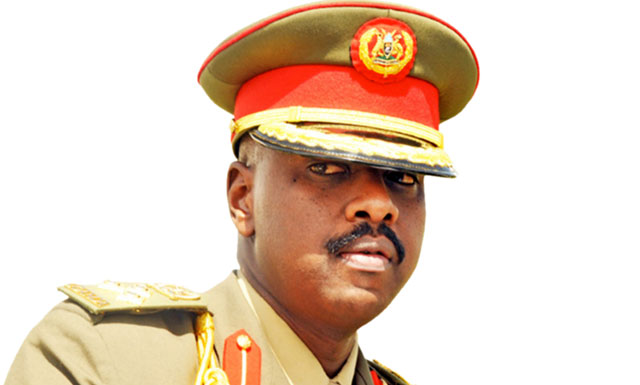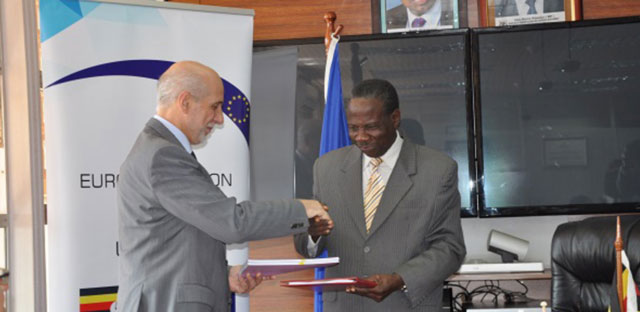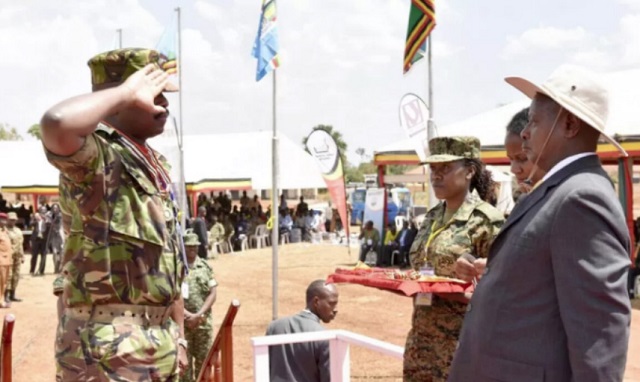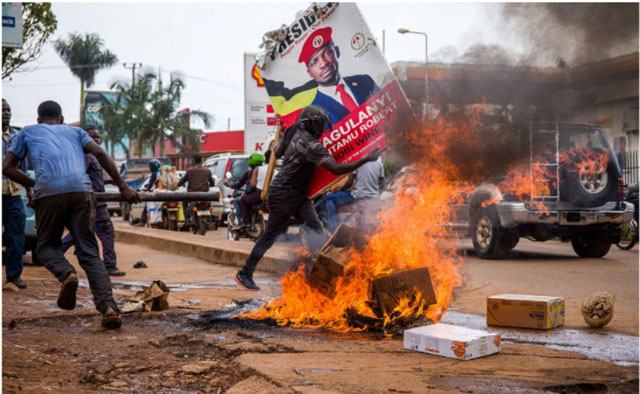
Researcher insists transition must be discussed seriously
COVER STORY | THE INDEPENDENT REPORTER | Who will succeed President Yoweri Museveni, and under what circumstances? Given President Museveni’s advanced aged—he turned 78 this year—his transition from power is no longer a purely theoretical debate.
The issue looms over Ugandan politics. However, there is no real debate on the issue. Instead, although the ‘transition question’ is on many people’s minds, it remains the subject of informal speculation and debate. It is barely discussed publicly—except through a discussion of the ‘Muhoozi project’, the way in which Museveni’s son, Lt. Gen. Muhoozi Kainerugaba, is being pushed forward as a candidate.
A new European Union Policy Paper wants to change that. The policy paper, which is research designed to provide clear recommendations for European Union (EU) policy makers, argues that the international community needs to use its foreign policy tools to place the transition issue at the centre of its engagement with the Museveni government.
“The transition needs to become a transversal issue for the international community, both in its political and development support to Uganda,” it says.
“It requires the EU to be bold,” the paper adds.
The paper says the transition question highlights the increasingly authoritarian nature of Museveni’s regime where political space has been increasingly closed off, state institutions have been structurally weakened and replaced by a largely personalised system of governance, and the prospect of change via the ballot has become increasingly unlikely.

The authors of the paper say the EU’s role on the transition issue is particularly important in a context where EU security and migration policies have been perceived as decoupled from its commitments to democracy.
Titled: `Uganda’s future: navigating a precarious transition, the role of the international community’ the paper argues that the current institutional context—characterised by patronage, corruption, and a strong personalisation—makes the transition from Museveni highly unpredictable, and potentially very costly.
It wants the `transition question’ to be debated publicly arguing that currently, at best, discussions on the transition are not welcomed; at worst, those who dare to address it or who harbour their own presidential ambitions are punished.
The paper quotes a journalist who reportedly says, ‘the conversation is absolutely muted. People think it’s not worth having a conversation about; you’ll be taking the wrong side’.
The paper says the international community must force Museveni’s hand using its budget support.
“Budget support, which is especially vulnerable to misuse in Uganda’s fragile democratic context, must be suspended in favour of other forms of aid,” it says.
It says donors should work in a coordinated manner to track every aid dollar and that a forensic understanding of the ways in which money is spent should be included in funding agreements from the start.
As a priority, it says, support to the security services should be stopped, given their continuous, well-documented yet unaccounted involvement in human rights abuses. This includes funding to the Justice, Law and Order Sector (JLOS) program, which mainly funds the Uganda police.
“Failure to do so, in view of past malfeasance, is increasingly perceived as tacit approval of the Museveni regime, and risks contributing to a disorderly transition,” it says.
The paper recommends that EU appoints a military attaché as a means to cultivate relationships with a more diverse range of actors in Uganda.
“Understanding of the crucial role of the armed forces in Uganda remains limited,” it says.
In a rather outdated tone, under what it calls, “broadening the conversation”, the paper recommends that the international community should elevate the capacity of actors in Ugandan civil society, independent media and local communities, to speak out about the transition.
“Any transition will need to be owned by Ugandan citizens,” it says but adds, “The EU should encourage initiatives by these groups to weigh in on Uganda’s political future”.
It argues for vibrant citizen action to pave the way for a “new generation of politics”. But this comes with a great risk in the highly repressive context that is Uganda, it warns. It adds that the EU should find novel ways to improve civil society’s access to interact directly with donors on their needs and strengthen its protection mechanisms for human rights defenders.
The research is supported by the Open Society European Policy Institute; which is the EU policy and advocacy branch of the Open Society Foundations network, based in Brussels. It works to influence and inform decision-making on EU policy, funding, and external action to maintain and promote open societies in Europe and beyond.
It is authored by Kristof Titeca, an academic who has extensively researched on governance and conflict in Central and Eastern Africa, in particular around the Democratic Republic of Congo and Uganda. In 2019 he published a book: ` Rebel Lives: Photographs from Inside the Lord’s Resistance Army’.Potential Transition Scenarios
The paper says that broadly speaking, there are two possible scenarios for the transition in Uganda, each of which has similar consequences.
In the first scenario, the president-for-life option, Museveni remains in power until his death.
Technically, in that case, the Constitution calls for the vice president to take over and for elections to be held within three months, a period in which the NRM would need to find a candidate. But, given the highly personalised nature of rule, the country’s fragile institutions, and a lack of political space for potential candidates, the party’s success in that endeavor would not be guaranteed.
A variety of constituencies would have a say in that process, including (but not limited to) the military, and different factions within the NRM, including regional, ethnic, and political factions. It is doubtful if the Ugandan political settlement will be able to handle these tensions.
“There is a high risk of a disorderly, unconstitutional, and violent clash over a potential candidate,” the paper says, “the consequences of such a clash are unpredictable and could range from the establishment of a more authoritarian state (in a best-case scenario) to regional conflict in a worst-case scenario.
In a second possible transition, Museveni’s son Muhoozi Kainerugaba would take power. Muhoozi has over the years rapidly risen through the ranks of the Army: initially as commander of the Presidential Guard Brigade, which eventually evolved into the Special Forces Command (SFC), created in 2008, and currently as the commander of the Army’s land forces.

Indeed, recently, the principal way in which the ‘transition debate’ is held is through a rather aggressive campaign to promote Muhoozi, including through an active social media campaign and his increased regional political role (e.g. through meetings with Rwandan President Kagame).
“The most plausible explanation for this campaign is that President Museveni is testing the waters to see how a Kainerugaba candidacy would be perceived,” the paper says.
If Muhoozi becomes the successor—in the case of the sudden death of the President, through an arranged transition, or through (flawed) elections— the consequences are equally unpredictable.
The paper notes how the ‘Muhoozi project’ previously put the Ugandan political settlement under serious pressure, as during the 2013 Tinyefuza/Sejusa scandal – when liberation veteran General David Tinyefuza (aka Sejusa) in early 2013 openly accused the regime of not only grooming Muhoozi for the presidency but also of planning to eliminate all those (liberation) veterans in the ruling elite opposed to the quick ascendance of the son.
The regime responded with a grand military reshuffle that affirmed the end of the veteran era and signaled an increasing concentration of power over the military and the state in the hands of the first family.
“Muhoozi does not have the popularity or constituency of his father,” the paper argues, “Interviewees point out that his candidature is not uniformly welcomed in the state administration, as it leads to ‘fear and disdain’ among some.”
In the words of one analyst: “Many are disquieted by the prospect: they do not want Muhoozi to land the job; and they fear a disorderly succession.”
It can be argued that Muhoozi and his contemporaries have taken over key positions within the Army, which some describe as the “SFCasation” of the Army.
At the same time, key actors from the older generation have been strategically sent into retirement, or into less powerful positions, particularly since the 2013 Sejusa affair.
Muhoozi’s influence goes beyond his formal position; he is able to make decisions and represent the army in ways that go against the hierarchy.
“Notwithstanding his power in the military, a potential takeover by Muhoozi could create severe tensions with other groups within the Army and party, who equally eye the Presidency and/or who feel uncomfortable with the ‘Muhoozi project’,” the paper says.
It says these tensions play out along a variety of lines, including ethnicity, and are largely suppressed under Museveni.
In any case, the ‘Muhoozi project’ will lead to increased reliance on the use of coercion, ultimately leading to an unpredictable escalation and in a worst-case violent conflict with regional implications.
Role of international community
Although the transition question is looming over much of Uganda’s day-to-day politics, the international community has not begun to appropriately address the issue, the paper argues.
“The main risk of the international community’s ‘business as usual’ strategy is that it further facilitates and entrenches ongoing authoritarian dynamics,” says the author.
Of course, the Ugandan population will determine its own future, but other countries—and donor countries in particular—have a role to play as well.
Importantly, the international community should be aware of its direct and indirect impact on national political dynamics, and any eventual transition.
Muhoozi’s recent efforts on the international stage are a good example of the role foreign governments play in shaping Uganda’s political climate. On Twitter, Muhoozi regularly posts photos of his meetings with foreign ambassadors. These posts (and photos) have a clear aim: to increase his national legitimacy by showcasing his international network (e.g., one tweet described the Italian ambassador as ‘My best European Ambassador. He is my brother.’).
Today it was my pleasure to meet the new Italian Ambassador to Uganda, H.E.@massi_mazzanti. Ugandan-Italian relations are historical and have always been very strong. We look forward to continued warm relations.I welcome him to Uganda and wish him a very successful tour of duty. pic.twitter.com/nBKKHfUHqc
— Muhoozi Kainerugaba (@mkainerugaba) January 21, 2020
By meeting Muhoozi, these ambassadors side-line the formal military hierarchy, strengthen Muhoozi’s position as a political figure, and further entrench the personalised form of governance in Uganda. The photos present Muhoozi in a statesman-like manner, bolstering his position politically and giving him an advantage over other potential candidates. In the words of one analyst, ‘Every time he puts out a tweet with an ambassador, it further sends the message: Don’t speak out against Muhoozi; he’ll be the next President.”
According to the paper, the international community players can play either a minimalist or maximalist role. In the maximalist scenario, the international community plays an active role in discussions preceding the transition and/or during the transition, consisting of a dialogue with the key players at the national level.
In the minimalist scenario, the international community work behind the scenes, speaking among themselves about the transition. In every policy and decision they ask themselves: In what way can each country’s projects and actions in Uganda contribute to an orderly transition, rather than further escalating authoritarianism?
According to one analyst: “If the EU and others keep as they are, and don’t act to prepare a peaceful transition, they become complicit of a crisis post-Museveni”.
Role of donor money
Donor aid cannot be seen as separate from these dynamics, the paper argues. It cites a widely publicised report commissioned by the World Bank in 2004 and leaked in the Ugandan press that argued that donor aid was central to the corruption of the Museveni regime, through budget support.
While the scale of budget support has declined since then, such funding continues, perpetuating these problems.
For example, the EU provides budget support to a number of sectors in Uganda’s government, including €60 million to the Justice, Law and Order Sector (JLOS), for three fiscal years starting in 2018-2019. But while 17 institutions are supported through JLOS, ‘frontline’ institutions such as the police, prisons, Department of Public Prosecution, and courts receive most of the funding.
The EU’s goal for such funding is to improve the human rights compliance of service delivery in the JLOS sector and reduce public sector corruption (including ‘grand corruption’). But, in 2019-2020 and 2020-2021, when the police received 44.9 and 47.7 percent of JLOS funding, it—and other security services—committed major human rights violations, especially during the 2021 elections.
Research has shown the limited reactions of donor countries to corruption scandals involving donor aid in Uganda. High-level actors are not held to account and reforms are at best ‘largely cosmetic’.
One reason for this apparent indifference is geopolitics; the Museveni regime is politically useful as a refugee-hosting country and as a key military ally in the region, particularly for the U.S. There is a consensus that donors don’t want to risk their strategic relationships with Uganda for the sake of democratic reforms or accountability.
But failing to confront the Museveni regime does have consequences for donors, says the paper.
First, their continued business-as-usual engagement with Museveni hurts their reputation, both among Ugandans and within their home countries. Civil society leader Godber Tumushabe described international donors in the Washington Post as the “biggest enablers of Museveni’s authoritarianism” while retired Ugandan diplomat Harold Acemah described the EU as having “bent over backwards in order to accommodate the NRM and Museveni”.
Also, donors’ inaction sends a message to the Ugandan government. As one journalist summarised, “As Museveni realises, he can rule with free reign, he is becoming more and more extreme: look at what happened in the recent elections compared to the last three. The regime becomes more and more free: extra-judicial killings happened in broad daylight, and there was no reaction from donors”.
Fear of ethnic conflict
The main concern of the authors of the paper appears to be that any post-Museveni conflict could have adverse ethnic overtones.
It notes how, although Museveni has endeavoured to play and ethno-regional balancing game in his government, the relationship with Baganda has gradually been deteriorating.
It points at how open conflict erupted in 2009 during the so-called ‘Buganda riots’, in which more than 40 people died. It notes that increased ethno-tensions can be seen in the Rwenzori massacre, in which more than 100 people were killed.
It notes that Museveni’s government has a clear overrepresentation of Westerners, which are ‘not only overrepresented in Cabinet, but also clearly dominated the inner core’.
This dynamic is mirrored within the NRM party, civil service, and parastatal agencies, it says. “Notwithstanding the NRM’s emphasis on anti-sectarianism, there has been a concentration of power among groups from the West, particularly among the Banyankole/Bahima—the ethnic group of Museveni,” it says.

With a pessimistic note, it cites other research which fears that the country may be sitting on a ‘time bomb’, particularly in terms of violence against the ruling region and ethnicities.
Ethnicity played a particularly important role in the 2021 elections. For the first time in multi-party elections under Museveni, the main opposition candidate, Bobi Wine, or Robert Kyagulanyi, did not originate from the Western region, but from Buganda. His party, the National Unity Platform, was portrayed as an ethnic Baganda party.
The overall situation is potentially explosive, with ethnicity coming increasingly to the foreground. Ethnic tensions are hotly debated on social media and political events are increasingly seen through an ethnic lens. For example, the discussion around the legitimacy of the health treatment abroad of the late Speaker of parliament, Jacob Oulanyah, devolved into accusations of tribalism. Land conflicts are also increasingly seen along ethnic lines, for example in the Buganda region. There is concern that ethnic tensions could erupt into something more lethal. Westerners have major concerns.
As one businessman argued: “For us, people from the West, the others think that we have profiteered. We as individuals seem to represent what has happened on a bigger scale in this country. For us, people from the West, this keeps us up at night. What is coming is ethnic cleansing. If there is a big issue, there will be cleansings. Remember the September 2009 events with the Baganda? It just takes one small thing and see the reaction. The truth is: we’re sitting on a time-bomb, we’re paying time. People are very concerned.”
A journalist phrased it in the following way: “I have a lot of friends, who, like me, are from the West, and they all fear. They hope that the big man (i.e. President Museveni) does the sensible thing. We have failed to understand what his plan is; and how he plans on going. But the moment he goes, all of us will become a target: that’s our biggest fear.”
 The Independent Uganda: You get the Truth we Pay the Price
The Independent Uganda: You get the Truth we Pay the Price



It is not a family project for Gen. Muhoozi to replace his father,are they the only elites in Uganda? We shall see come 2026 how the secret balloting will justify the end be patient and wait.
In other words, since hanging onto power is a matter of do or die; out of desperation it will be the same “Problem of Africa” who will accidentally push the button or light up the Time-bomb’s fuse? and Boom!
I have followed the article from the first word to last full stop. The challenge with Uganda is that when the colonialists were setting up pillars to build a country they called Uganda, they literally disintegrated the four powerful monarchial administrations (Ankole, Bunyoro, Tooro and Buganda).
If Uganda was created on the basis of Federalism, there wouldn’t have been the 1966 Buganda crisis, there wouldn’t have been 1971 coup, there wouldn’t been other coup of the Okellos and there wouldn’t have been a 5 year gorilla war which claimed hundreds of thousands of native lives.
Baganda are beginning to realize that they have lost their heritage and keep losing their ancestral land in the name of unity. Yet, if one wanted to talk of UNITY, it is a topic, which cannot be tought to Baganda.
Buganda is the vanguard of hospitality, and does not need any lectures about importance of collaboration with other tribes. Buganda and the rest of Uganda, is going through suppression because she was betrayed by the British that had the agenda to control a bigger chunk of a region in the name of EAC.
Buganda has seen it all; and ever since the British stepped their first foot on Buganda’s soil, everything was disorganized.
What can help this country is to start thinking abour FEDERALSTATES OF UGANDA. For, as we speak, there is gold in Busoga, Buganda has embarked on coffee and has a Lake. There is oil is in Bunyoro. There are expensive marbles and Gold is in the Karamoja sub region. Otherwise the natural resources will continue to be siphoned without benefiting the Indigenous people, and continue with endless chaos.
What does this article mean? Don’t the EU authors know that we don’t freely talk about death of people who are not sick no matter what scenarios you are trying to postulate? Do the authors know something about Mr. Musevenis health that we all need to know? I find this article daring and moreover being published by Andrew Mwenda! Hmm! They even exposit ethnic tension? Do they know how very ripe this one is? It’s written all over the wall but not in words. Whatever the case, the ordinary westerners fears are understandable, the whole country sees them as the the people abusers!!!! Tamale Mirundi called them the banyampi! Poor fellows.
Anyway, we pray for peace and forgiveness.
General Muhoozi Kainerugaba how to connect with the project I have 26years in my community we have so many youth needs you
Very nice idea, in fact I would like to join team muhoozi project. Am from Kazo district .